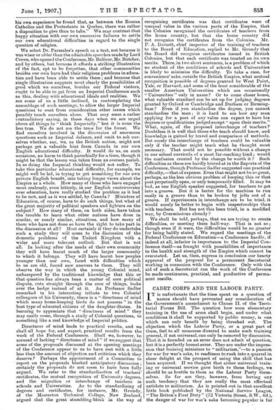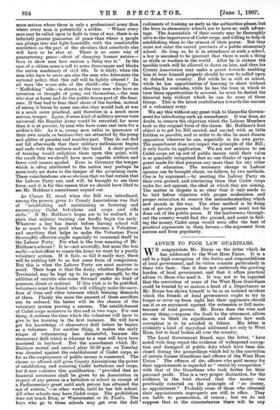CADET CORPS AND THE LABOUR PARTY.
IT is unfortunate that the time spent on a question of names should have prevented any consideration of the Government's amendment to Clause II. of the Terri- torial Forces Bill. The question how soon elementary training in the use of arms shall begin, and under what conditions it shall be supported by public money, is one which can only benefit by being threshed out. The objection which the Labour Party, or a great part of them, feel to all measures directed to make such training general, if not universal, can only be removed by discussion. That it is founded on an error does not admit of question, but it is a perfectly honest error. They are under the impres- sion that training ministers to "militarism,"—to a passion for war for war's sake, to readiness to rush into a quarrel in sheer delight at the prospect of using the skill that has been acquired. If we thought that either universal train- ing or universal service gave birth to these feelings, we should be as hostile to them as the Labour Party them- selves. So far are they, however, from having any such tendency that they are really the most effectual antidote to militarism. As is pointed out in that excellent little book published by the National Service League, " The Briton's First Duty" (72 Victoria Street, S.W., 6d.), the danger of war for war's sake becoming popular is far
more serious where there is only a professional army than where every man is potentially a soldier. "Where every man may be called upon to fight in time of war, there is an infinitely greater guarantee of peace than where a people can plunge into war light-heartedly, with the comfortable conviction on the part of the shouters that somebody else will have to be shot at. There is no surer way of guaranteeing peace—short of changing human nature— than to show men how serious a thing war is." In the case of a citizen army a call to arms disarranges and blocks the entire machinery of civil life. Is it likely, when the men who have to serve are also the men who determine the national policy, that this call will be lightly uttered P In all wars the worse side of the shield—the "Jingo," the " Mafficking" side—is shown in the very men who have no intention or thought of going out themselves,—the men who stay at home and do the public-house part of the busi- ness. If they had to bear their share of the burden, instead of seeing it borne by some one else, they would look at war in a much more practical, and therefore in a much more serious, temper. Again, if some kind of military service were universal, the Regular Army would be recruited, far more than it is at present, by men who have some real turn for a soldier's life. As it is, young men enlist in ignorance of their own minds, or because they are attracted by the pomp and glitter of parades and marches past. They do not find out till afterwards that their military enthusiasm begins and ends with the uniform and the band. A short period of training would enlighten them upon this point, with the result that we shouldhave more capable soldiers and fewer civil careers spoiled. Even in Germany the temper which is often attributed to the nation may perhaps be more truly set down to the temper of the governing caste. These considerations are so obvious that we feel certain that the Labour Party can, and will, be brought to see their force, and it is for this reason that we should have liked to see Mr. Haldane's amendment argued out.
As Clause II. stood when the Bill was introduced, among the powers given to County Associations was that of "establishing and maintaining or fostering and encouraf.,,iug Cadet battalions and corps and rifle clubs." If Mr. Haldane's hopes are to be realised, it is plain that military training can hardly begin too early: Whatever a boy has learnt before leaving school will be so much to the good when he becomes a Volunteer, and anything that helps to make the Volunteer Force thoroughly effective ought especially to commend itself to the Labour Party. For what is the true meaning of Mr. Haldane's scheme ? It is—not avowedly, but none the less really—a last effort to create the Army we want by a purely voluntary system. If it fails, as fail it easily may, there will be nothing left to us but some form of compulsion. But this is what the Labour Party are most anxious to avoid: Their hope is that the Army, whether Regular or Territorial, may be kept up to its proper strength by the addition of recruits who come forward under no kind of pressure, direct or indirect. If this wish is to be gratified, volunteers must be found who will willingly make the sacri- fices of time and other interests which training demands of them. Plainly the more the amount of these sacrifices can be reduced, the better will be the chance of the voluntary system proving a success. The establishment of Cadet corps ministers to this end in two ways. For one thing, it reduces the time which the volunteer will have to give to his training in the first instance. He will have got his knowledge of elementary drill before he begins as a volunteer. For another thing, it makes the early stages of volunteering less distasteful, because the elementary drill which is irksome to a man will have been mastered in boyhood. But the amendment which Mr. Haldane moved and carried after 10.30 p.m. on Tuesday was directed against the establishment of Cadet corps, so far as the employment of public money is concerned. The clause as altered still gives County Associations the power of establishing and assisting Cadet battalions and corps, but it now contains this qualification: "provided that no financial assistance shall be given by an Association in respect of any person in a battalion or school in receipt of a Parliamentary grant until such person has attained the age of sixteen,"—in other words, until he has left school. All other schools may have Cadet corps. The prohibition does not touch Eton, or Westminster, or St. Paul's. The boys, who go to these schools may get over the dull
rudiments of training as early as the authorities please, but the boys in elementary schools are to have no such advan- tage. The Association of their county may be thoroughly alive to the importance of Cadet corps, and willing to help in establishing them to the utmost of their power. But they must not enter the sacred precincts of a public elementary school. So long as he is in attendance at such a school, a boy is assumed to be ignorant that there is such a thing as strife or warfare in the world. After he is sixteen the terrible truth will be allowed to dawn on him, and then his County Association may make a grant towards enabling him to bear himself properly should ho ever be called upon to defend his country. But while he is still at school, while he has opportunities of learning to shoot without shooting his comrades, while he has the time in which to turn these opportunities to account, he must be denied the financial help without which he can do none of these things. This is the latest contribution towards the success of a voluntary army.
We say this without any great wish to blame the Govern- ment for introducing such an amendment. It was done, no doubt, to remove the objection which the Labour Members took to the original form of the clause. Mr. Haldane's first object is to get his Bill carried, and carried with as little friction as possible, and in order to do this he must disarm opposition wherever he can, especially in his own party. The amendment does not impair the principle of the Bill; it only limits its application. We are not anxious to see Cadet corps set up out of public money until their value is so generally recognised that no one thinks of opposing a grant made for that purpose any more than for any other part of education. The necessary change in Labour opinion can be brought about, we believe, by two methods. One is by argument,—by meeting the Labour Party on their own ground, and convincing them that Cadet corps make for, not against, the ideal at which" they are aiming. The matter in dispute is so clear that it only needs to be laid before objectors with proper moderation and proper reiteration to remove the misunderstanding which now stands in the way. The other method is by doing out of private purses what for the present must not be done out of the public purse. If the landowners through- out the country would find the ground, and assist in find- ing the money, Cadet corps would soon offer the best of practical arguments in theis favour,—the argument from success and from popularity.







































 Previous page
Previous page